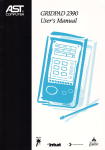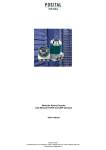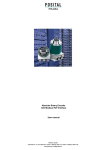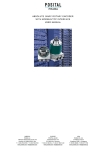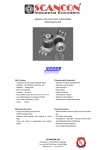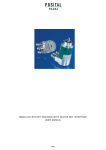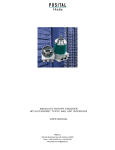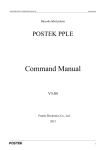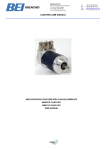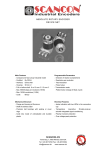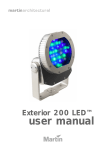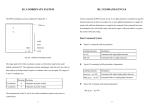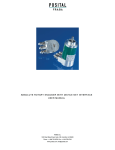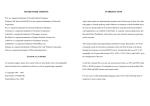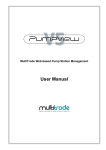Download Manual
Transcript
Absolute Rotary Encoder with Ethernet Powerlink Interface Powerlink protocol version 1 User manual FRABA POSITAL GmbH Schanzenstr. 35, D-51063 Köln, Telefon +49(0)221-96213-0, Telefax +49(0)221-96213-20 www.posital.de, [email protected] Imprint FRABA POSITAL GmbH Alteration of Specifications reserved Technical specifications, which are described in Schanzenstr. 35 51063 Köln this manual, are subject to change due to our permanent strive to improve our products. Phone +49/221/96213-0 Document information Internet Fax www.posital.com +49/221/96213-20 File name: Date: UME-OCD-EP August 2005 e-mail [email protected] Version number: Author: 2.00 Klaus Matzker Copyright Service-Phone The company FRABA POSITAL claims copyright on this documentation. It is not allowed to modify, For technical support, questions and suggestions for improving our products and documentations call to extend, to hand over to a third party and to copy this documentation without written approval by the our telephone line: +49/221/96213-0 company FRABA POSITAL. Nor is any liability assumed for damages resulting from the use of the information contained herein. Further, this publication and features described herein are subject to change without notice. Version 5/08 Page 2 UME-OCD-EP 1 Introduction .......................................................4 6.3 Minimum (mechanical) lifetime ...................... 19 1.1 Absolute Rotary Encoders ...............................4 6.4 Environmental Conditions .............................. 19 1.2 Ethernet ...........................................................5 7 Mechanical Drawings ..................................... 20 1.3 TCP/IP .............................................................5 7.1 Synchro Flange (S)........................................ 20 1.4 UDP .................................................................6 2 Hardware set-up and Ethernet Connection ....7 7.2 Clamp Flange (C) .......................................... 20 2.1 Network Topology ............................................7 2.2 Connecting an Absolute Encoder.....................8 2.3 Ethernet Cables ...............................................8 7.3 Hollow shaft (B) ............................................. 21 8 Models / Ordering Description....................... 22 9 Accessories and Documentation .................. 23 10 Glossary ........................................................ 23 2.3.1 RJ45 – M12 crossed .....................................8 2.3.2 RJ45 – M12 straight......................................8 2.3.3 M12 – M12 crossed ......................................8 2.4 Diagnostic LED’s..............................................9 3 Network Configuration ...................................10 4 Project integration ..........................................11 5 Powerlink protocol..........................................12 5.1 Powerlink cycle ..............................................12 5.2 Powerlink messages ......................................13 6 Technical Data.................................................18 6.1 Electrical Data................................................18 6.2 Mechanical Data ............................................18 Flange..................................................................18 Synchro (S)..........................................................18 Clamp (C) ............................................................18 Hollow shaft (B)....................................................18 Version 5/08 Page 3 UME-OCD-EP 1 Introduction 1.1 Absolute Rotary Encoders Absolute rotary encoders provide a definite value The encoder is able to provide as output data the for every possible rotary position. All these values are reflected on one or more code discs. The position value without further calculation beams of infrared LEDs are sent through the code discs and detected by Opto-Arrays. The output A Powerlink managing node, operating as master, must be in a network to read out the process data from the encoder. signals are electronically amplified and the resulting value is transferred to the interface. The absolute rotary encoder has a maximum resolution of 65,536 steps per revolution (16 Bit). The Multi-Turn version can detect up to 16,384 revolutions (14 Bit). Therefore the largest resulting reso30 lution is 30 Bit = 2 = 1,073,741,824 steps. The standard Single-Turn version has 13 Bit, the standard Multi-Turn version 25 Bit. The encoder sends the data in decimal code via standard or fast Ethernet (100 Base T). At present it supports the following protocol: Ethernet Powerlink with protocol version 1. Version 5/08 Page 4 UME-OCD-EP 1.2 Ethernet The present developments in the field of Industrial 1.3 TCP/IP Even though Ethernet and TCP/IP are often used Ethernet are based on the vision of an integrated access of all data of a company through a uniform together and sometimes used interchanged, these are three different kinds of terms and you should communication system. In higher levels of enterprise communication Ethernet is the main medium carefully separate them. The coherences are based on the ISO/OSI reference model after of data transfers. Combined with other IT technologies it is internationally standardized. In the ISO/IEC 7498 that is needed to basically understand these terms. long run automation engineers will benefit from the rapid technological progress in the mass markets Ethernet only describes layer 1 and 2 in this model, of IT and web technologies. nevertheless the term is often used in error in engineering as description of all layers between 1 Ethernet technically provides a system with higher data transfer rates than common field bus systems. and 7. TCP/IP and UDP do have a statistical access method to access the medium thereby prohibiting The IP protocol of layer 3 was developed in the 70’s by the US military (MIL-STD 1777). It allows a determined response times. Many developments are intensely done on additional real time mecha- universal addressing independent of the hardware involved in heterogeneous networks. It also man- nisms, e.g. Ethernet Powerlink ages the transfer of large packets by splitting them up into smaller packets. The well-known TCP protocol (MIL-STD 1778) ensures a reliable data transfer. Http (RFC 2068) and SMTP (MIL-STD 1781) belong to layer 7 of the OSI model and allow to transfer data and documents via web browser or to send e-mails. Version 5/08 Page 5 UME-OCD-EP 1.4 UDP User Datagram Protocol is utilized to send data that does not need to be transferred in a reliable way. The UDP packet is encapsulated in an IP packet which in turn is encapsulated in a PPP packet. Both UDP and IP have checksum octets and the PPP packet has its FCS octets however this can only guarantee that the data and the destination are correct. If a packet is lost, it will not be resent using UDP, this issue is only addressed by the TCP protocol. 1.5 OSI-Modell Layer 7 Application Layer 6 Presentation Layer SMTP, FTP, HTTP 5 Session Layer 4 Transport Layer TCP and UDP 3 Network Layer IP and IPX 2 Data Link Layer Ethernet 1 Physical Layer 10BASET, 100BASET Version 5/08 Page 6 Application Data transport Cable UME-OCD-EP 2 Hardware set-up and Ethernet Connection 2.1 Network Topology Using Ethernet there are different kinds of topolo- network cable (not a crossover cable). You need gies possible. The connection of the encoder can be made directly to a hub. If you use a direct con- at least a cable of category 5 to get a data transfer rate up to 100 Mbit. nection to a computer without network components in between, you need to use a standard, “straight” The symbolized structure shows a classic star Only hubs should be used because of low frame topology and a line cabling structure. With encoder jitter and latency time. For fulfilling time require- version 00 you must directly connect the encoder ments up to 10 hubs can be connected together device to a hub. An integrated hub in encoder with a maximum cable length of 100m. version A1 offers both: star or more useful a line These requirements are specified in Powerlink structure. specification. For more details visit the web site: www.ethernet-powerlink.org. Version 5/08 Page 7 UME-OCD-EP 2.2 Connecting an Absolute Encoder The encoder is connected by a 5 pin M12 connector for the power supply and one 4 pin, Encoder version A1 uses a second D-coded connector and provides an integrated hub func- D-coded M12 connector for Ethernet. tionality. On or in the packaging of the connector is the mounting description. Connector Ethernet Connector power supply 4 pin female, D-coded 5 pin male, A-coded Pin Number Signal Pin Number Signal 1 Tx + 1 +24 V 2 Rx + 2 +24 V 3 Tx - 3 0V 4 Rx - 4 0V 5 PE Sketch on encoder view 4 3 4 3 5 2 1 1 2 2.3 Ethernet Cables Signal 2.3.3 M12 – M12 crossed Signal M12 Pin M12 Pin Signal Rx+ Tx+ 1 2 Rx+ 4 Rx- Tx- 3 4 Rx- 1 Tx+ Rx+ 2 1 Tx+ 3 Tx- Rx- 4 3 Tx- 2.3.1 RJ45 – M12 crossed Signal RJ45 Pin M12 Pin Tx+ 1 2 Tx- 2 Rx+ 3 Rx- 6 2.3.2 RJ45 – M12 straight Signal RJ45 Pin M12 Pin Signal Tx+ 3 1 Tx+ Tx- 6 3 Tx- Rx+ 1 2 Rx+ Rx- 2 4 Rx- Version 5/08 Page 8 UME-OCD-EP 2.4 Diagnostic LED’s Ethernet TCP/IP Err Run Rx2 Link2 Col2 Rx1 Col1 Link1 PWR Port 1 Port 2 LED Color Description for LED = on Rx1 Yellow Incoming and outgoing traffic for port 1 Link1 Green Link to another Ethernet component for port 1 Collosion1 * Red Ethernet collisions on the bus for port 1 Rx2 * Yellow Incoming and outgoing traffic for port 2 Link2 * Green Link to another Ethernet component for port 2 Collosion2 * Red Ethernet collisions on the bus for port 2 Error * Red Reserved Run * Green Reserved * Only for version A1 Version 5/08 Page 9 UME-OCD-EP 3 Network Configuration The rotary encoder can be used either with the Ethernet Powerlink IP address which can be programmed or the wired IP 10.10.10.10. A switch to choose corresponding option is located in the connection cap. If the switch 2 is in position “off”, the POWERLINK IP has been chosen (default!). Powerlink Protocol version 1: The encoder is pre-configured with a fixed Powerlink node number 100, which cannot be changed by the user. Be aware of this restriction! The hex coded rotary switches cannot be found in the cap as shown in the picture. The function of the DIP switch can be used if Encoder version A1: another than EPL IP address is needed or the Both Hex rotary switches are used to configure user is not sure about a programmed node IP. the Powerlink (EPL) node address. Allowed address range for a controlled node is: 1-239. Version 5/08 Page 10 UME-OCD-EP 4 Project integration This integration description is related to B&R The Powerlink encoder with EPL protocol V1 control units and automation studio. has currently a fixed node number 100 at fac- For adding an encoder into your project a generic Powerlink device is needed. So you have to add the library ‘POWERLNK’ first and use a generic device. To realize a data connection the following information must be configured for the generic device (here: encoder): because only one process value is used: position value. The data length is 8 bytes whereby only 4 bytes contain really updated values. All other bytes are set to 0. Ordered data bytes of a read position value within a EPL frame is low byte first and at least MSB. - Controlled node number - Offset for the data pointer within data frame - tory. There is no data offset in the EPL frame, Position value coding: DB1 Length of data type DB2 LSB DB3 DB4 DB5 DB6 DB7 DB8 MSB 00 00 00 00 Data exchange direction: The encoder offers only IN Data as Poll Response message (PRes). No data out messages contained within Poll Request (PReq) message can Version 5/08 Page 11 be transmitted to the encoder. UME-OCD-EP 5 Powerlink protocol 5.1 Powerlink cycle The Powerlink protocol offers an isochronous With Start period the devices latch their process communication. A deterministic transmission is a data. This action is synchronous realized via the requirement whole EPL network. out of high performance applications. The deterministic network cycle is Isochronous period: CN are processed what achieved with a time slot principle, which is means that the MN node request the nodes after descripted in following picture. An EPL cycle is each other. In this time slot the process values divided into 4 periods: Start, Isochronous, are transmitted. Asynchronous, Idle Period. Asynchronous period: Used for non time critical data. Idle period: Remaining time till next cycle. Used to compensate different processing cycle times to achieve an outside constant cycle time. Version 5/08 Page 12 UME-OCD-EP 5.2 Powerlink messages Ethernet Powerlink frames are embedded in a destination and source address within Ethernet standard Ethernet frame. Because of that it is standard header the MAC address is given. A possible to use standard diagnostic tools in an MAC address is built up with 6 bytes, here are EPL network. But you must be aware, that a the first 5 bytes constant: 00-60-65-00-49., the standard PC can be able to interrupt the con- sixth octet is the node number. The Ethernet trolled EPL cycle. As a result the cycle can not type field is set to: xxxx. be deterministic anymore. Powerlink specific data: The Ethernet frame is divided into 3 parts: See the marked entries, which are fixed for all Ethernet standard header, Ethernet powerlink other EPL frames. The rest is defined depending part as standard Ethernet data and annex. For on the specific service identifier (message type). Version 5/08 Page 13 UME-OCD-EP 5.2.1 Powerlink messageSoC This message is sent as a broadcast telegram to with the information from chapter 5.2 you can all CN on the network. All devices will sample on see, that the first three entries are out of the EPL receiving this telegram their input state. The frame. Grey colored area is specific data accord- encoder is latching in this moment the current ing to the SoC message. position value. Total number of transmitted bytes is 64 octets, according to Ethernet standard The structure of the frame is given in the follow- framing. If you compare the given table below ing picture. Version 5/08 Page 14 UME-OCD-EP 5.2.1 Powerlink message Poll Request Data (out data) which is sent from the Managing message is needed to get input data from the node (MN) to the Controlled node (CN). Inde- controlled node. This message is used to allow pendent if data has to be send out, the PReq the CN a time slot for transmission within an 5.2.2 Powerlink message Poll Response transferred data from a CN to a MN. If the sent Fatal error in CN with break down of service. MS data is valid, which is indicated by a set RD flag, is used, when multiplexed time slot mode is in the encoder position value is given in the IN operation. WA is a warning flag and the CN is DATA field. Minimum size for IN Data is 36 oc- still in operation. EX indicates an exception, that tets according to standard Ethernet framing. Poll unread entries exist. size is the size of input data in octets. ER flag: Version 5/08 Page 15 UME-OCD-EP 5.2.2 Powerlink message End of Cycle The End of Cycle message is sent as broadcast cycle is indicated. The MN is not sending this information to all CN in the EPL network. With frma if an error occurred. Frame size is 64 octets this message the CN are allowed to take over in total with overhead. their out data. Additional the end of isochronous Version 5/08 Page 16 UME-OCD-EP 5.2.2 Powerlink message Ident Channel This message is only MN internal and can not be the MN can identify, how the CN is configured accessed by an application. With this message and additional information. Encoder settings Device variant: 150 (dez) Hardware revision: 1 Poll In size : 8 Firmware revision: 1 Poll out size: 0 Version 5/08 Page 17 UME-OCD-EP 6 Technical Data 6.1 Electrical Data Supply voltage 10 - 30 V DC* (absolute limits) Power consumption max. 4 Watt EMC Emitted interference: EN 61000-6-4 Noise immunity: EN 61000-6-2 Bus connection Ethernet Powerlink V2, V1 Transmission rate 100 MBit Accuracy of division ± ½ LSB (12 bit), ± 2 LSB (16 bit) Step frequency LSB Max. 800kHz (internal valid code) Electrical lifetime > 10 h Device addressing Programmable IP-Address with 2hex coded rotary switches 5 6.2 Mechanical Data Housing Aluminum, optional stainless steel Lifetime Dependent on shaft version and shaft loading – refer to table Max. shaft loading Axial 40 N, radial 110 N Inertia of rotor ≤ 30 gcm Friction torque ≤ 3 Ncm (without shaft sealing) RPM (continuous operation) Singleturn: max. 12.000 RPM Multiturn: max. 12.000 RPM 2 Shock (EN 60068-2-27) ≤ 100 g (halfsine, 6 ms) Permanent shock (EN 60028-2-29) ≤ 10 g (halfsine, 16 ms) Vibration (EN 60068-2-6) ≤ 10 g (10 Hz ... 1,000 Hz) Weight (standard version) Singleturn: ≈ 500 g Multiturn: ≈ 700 g Singleturn: ≈ 1,000 g Multiturn: ≈ 1,400 g Weight (stainless steel version) Flange Clamp (C) Hollow shaft (B) Shaft diameter 6 mm 10 mm 10 mm 15 mm Shaft length 10 mm 20mm 20 mm - - - - 15 mm / 30 mm hollow shaft depth min. / max. Version 5/08 Synchro (S) Page 18 UME-OCD-EP 6.3 Minimum (mechanical) lifetime 8 Flange Lifetime in 10 revolutions with Fa / Fr 40 N / 60 N 40 N / 80 N 40 N / 110 N C10 (Clamp flange 10 x 20) 247 104 40 S10 (Synchro flange 10 x 20) 262 110 42 S6 (Synchro flange 6 x 10) without shaft sealing 822 347 133 S6 (Synchro flange 6 x 10) with shaft sealing: max. 20 N axial, 80 N radial 6.4 Environmental Conditions Operating temperature 0 .. +60°C Storage temperature - 40 .. + 85 °C Humidity 98 % (without liquid state) Protection class (EN 60529) Casing side: IP 65 Shaft side: IP 64 (optional with shaft sealing: IP66) Version 5/08 Page 19 UME-OCD-EP 7 Mechanical Drawings 7.1 Synchro Flange (S) available in 2 versions Synchro flange d / mm l / mm Version S06 6f6 10 Version S10 10h8 20 Single-Turn=88, Multi-Turn=98 35 3xM4x6 1 3x Ø59 (Ø61)* Ø42 Ø60 68 Ø60 d ø58 ø50 f7 ° 20 23 l * Edelstahl / Stainless steel 3 3 24 4 7.2 Clamp Flange (C) Single-Turn=88, Multi-Turn=98 30 35 3xM4x6 3x 3xM3x6 0° 12 8 Ø4 15° 68 23 Ø60 Ø36 f7 Ø10 h8 Ø53 Ø58 1 Ø59 (Ø61)* 18 3x12 0° 10 3 * Edelstahl / Stainless steel 3 24 Version 5/08 Page 20 UME-OCD-EP 7.3 Hollow shaft (B) Single-Turn=106, Multi-Turn=116 72 Ø63 35 3,3 20 Ø60 Ø60 68 F7 Ø15 23 20° Ø59 (Ø61)* 1,3 Anlagekante an Momentenstütze Ø3,2 * Edelstahl / Stainless steel 24 Max. W ** = 30 Min. W ** = 15 ** Welleneinstecktiefe (hollow shaft depth) Mounting instructions The clamp ring should only be tightened after Maximum radial and axial misalignment of the the shaft of the driving element was inserted into drive shaft:: the hollow shaft. The diameter of the hollow shaft can be reduced axial radial to 12 mm, 10 mm or 8 mm by using an adapter static ± 0.3 mm ± 0.5 mm (this reducing adapter can be pushed into the dynamic ± 0.1 mm ± 0.2 mm hollow shaft). Version 5/08 Page 21 UME-OCD-EP 8 Models / Ordering Description Description Type Key Optocode OCD- E_ Interface Powerlink EPL V1 (Protocol) EPL V2 1 2 Version 2 x M12 Integr. hub, 3x M12 Code Binary Revolutions (Bits) Singleturn B- __ __- _ __ _- ___ 00 A1 B 00 Multiturn (4096 revolutions) 12 Multiturn (16384 revolutions) 14 Steps per revolution 8,1924 (Bits) Flange 65,536 Clamp flange Shaft diameter Synchro flange Hollow shaft 10 mm Mechanical options 06 mm 15 mm (hollow shaft) Without Connection __ 13 16 C S B 10 06 15 0 Shaft sealing (IP66) S Stainless steel version V Customized C Radial, M12 connectors PRM Standard = bold, further models on request Version 5/08 Page 22 UME-OCD-EP 9 Accessories and Documentation Description Type Connector M12 4 pin male D-Coded Connector M12 5 pin female Shaft coupling ** Drilling: 10 mm GS 10 Drilling: 6 mm GS 06 Clamp disc ** 4 pcs. / AWC SP 15 Clamp ring ** 2 pcs. / AWC SP H Reducing adapter *** 15 mm to 12 mm RR12 Reducing adapter *** 15 mm to 10 mm RR10 Reducing adapter *** 15 mm to 8 mm RR8 User manual * Installation / configuration manual, English UMD-EP User manual * Installation / configuration manual, German UME-EP * These can be downloaded free of charge from our homepage www.posital.de. ** usable only for full shaft *** usable only for hollow shaft We do not assume responsibility for technical inaccuracies or omissions. Specifications are subject to change without notice. 10 Glossary Term Explanation 10 Base T Transmission line with 10 Mbit data transmission rate 100 Base T Transmission line with 100 Mbit data transmission rate ASCII American Standard Code for Information Interchange ASCII describes as code the correlation from digital integers to a normal font described character. Batch file Script program for MS-DOS Baudrate Transmission rate; it display the transmission bits per second Binary Numeric system with value 0 or 1. Browser Software program to display HTML-Sides on different operating systems (Linux, Unix, Windows, ...) CAT5 Terminations for transmission rates up to 100 Mbit. CRC The cyclic redundancy check is a method from the information technology to control a checksum for data, to reduce errors by the transmission. EMC Electromagnetic compatibility, there are rules to verifying devices. Ethernet Ethernet is a computer network technology based on frames. Fast Ethernet Transmission technology with 100 Mbit transmission rate. FCS-Bytes The Frame Check Sequenz-Bytes are a 32 Bit CRC-Checksum. Flash Internal memory, saved data will be available after power down. Version 5/08 Page 23 UME-OCD-EP HTML The Hypertext Markup Language is a document format used in the World Wide Web to be displayed by a browser HTTP The Hypertext Transfer Protocol is a stateless transmission protocol for data transmission. Hub The hub connects different network segments e.g. in an Ethernet network. IP-Adresse IP-address allow a logic addressing from computer in a network. IP-Protokoll The Internet Protocol is widespread in computer networks. It is the implementation of the internet layer of the TCP/IP-model Mbit Transmission rate or baud rate, million bits per second OCD Acronym: OPTOCODE, name of an encoder series manufactured by FRABA POSITAL. OSI-Modell The Open System Interconnection reference model is a open layer model for the organisation of a communication. PPP-Packet The Point-to-Point Protocol will be need for a connection establishment. It enables the transmission between different network protocols. SMTP Simple Mail Transfer Protocol managed the transmission of e-mails. Switch A switch is an electronic device to connect computers e.g. network segments in a local network. Unlike a hub, a switch uses stacks to avoid network collisions. TCP The Transmission Control Protocol is a connection orientated transmission protocol, in a network. TCP-Client MS-DOS program available from FRABA to communicate with the encoder. UDP User Datagram Protocol is utilized to send data that does not need to be transferred in a reliable way. Version 5/08 Page 24 UME-OCD-EP 11 History Version document 1.00 Initial version of this document. Version document 2.00 With encoder version 01 the pin out of the Ethernet connector is changed. This is documented in the manual revision V2.00. Version 5/08 Page 25 UME-OCD-EP

























